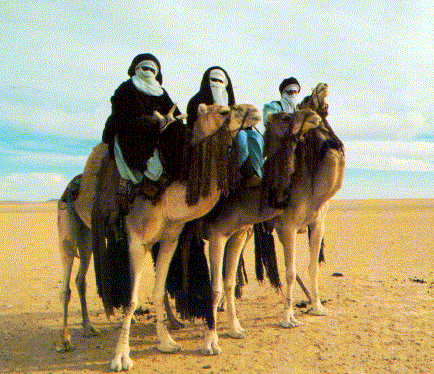   The majority of Libyans are Arabs, who trace their ancestry to the intermarriage of Arab & Berber after the arrival of Arabs to Libya in the seventh century. They are found mainly clustered around the urban areas of Tripoli and Banghazi. They also are among the Bedouin tribes in the desert. Some Bedouins move with their herds, searching for grazing land. They roam in the summer, then settle for the winter.
The majority of Libyans are Arabs, who trace their ancestry to the intermarriage of Arab & Berber after the arrival of Arabs to Libya in the seventh century. They are found mainly clustered around the urban areas of Tripoli and Banghazi. They also are among the Bedouin tribes in the desert. Some Bedouins move with their herds, searching for grazing land. They roam in the summer, then settle for the winter.
|
   The Berbers have lived in Libya since the 10th century BC, long before the first Phoenecian sailors met them on the Libyan coast. Some true Berbers retain older customs and speak only
the Berber language. They are the largest non-Arab minority. Still, they comprise only 4 percent of the Libyan population. Berbers live in small villages in the highland of western Libya and in the
coastal city of Zwara. Berber place-name have survived in the Jabal Nafusah.
The Berbers have lived in Libya since the 10th century BC, long before the first Phoenecian sailors met them on the Libyan coast. Some true Berbers retain older customs and speak only
the Berber language. They are the largest non-Arab minority. Still, they comprise only 4 percent of the Libyan population. Berbers live in small villages in the highland of western Libya and in the
coastal city of Zwara. Berber place-name have survived in the Jabal Nafusah.
|
The Touareg peoples inhabit the southern and western of Libya. They trace their origins to a society of nomads who lived in the Sahara Desert. Like all Libyans, the Touareg follow Islam. Touareg men usually don't work they become poets or warriors. Women dominate the economy of the tribal . Property, and inheritances are passed among female members of the family. |  on their camels (the ship of the desert) it can drink about 75 Liters (20 gal.)of water at one time. You can ignore rumors that water is stored in its hump. |
Main page/الصفحه الرأسيه
|
Homeland /صفحه
ليبيا
|
Specials
|
Pictures/صور
من بلأدي
|
Packers
Online Friends
|
More to come
|
Top of this page


© 1997
![]() hatms@msn.com
hatms@msn.com